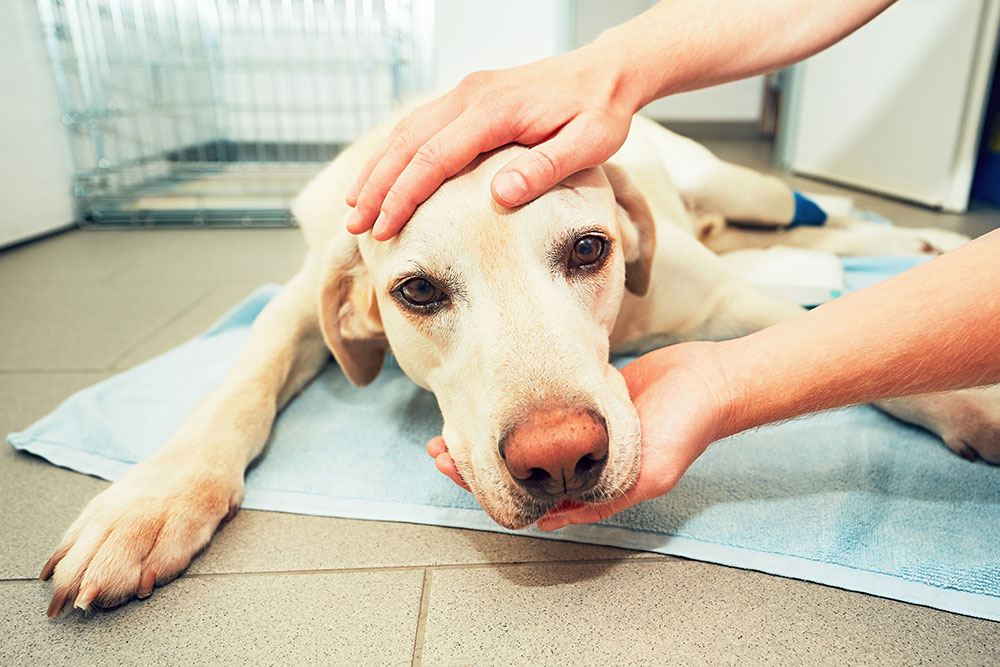Cancer is one of the leading causes of illness and death in pets, making early detection crucial for improving prognosis and treatment options. Common cancers in pets include lymphoma, mast cell tumors, melanoma, and sarcomas. Recognizing early signs, such as unexplained weight loss, persistent lumps, non-healing sores, appetite changes, or difficulty breathing, can significantly impact treatment success.
At Valley Center Veterinary Clinic, we use advanced diagnostic techniques like cytology and biopsy to detect cancer early and create effective treatment plans tailored to each pet’s needs.
What is Cytology? A Key Tool for Early Cancer Diagnosis
Cytology is a non-invasive, quick, and effective diagnostic test that allows veterinarians to examine cells under a microscope to determine if a tumor is benign or malignant.
How Cytology Works
- A veterinarian collects cells from a lump or suspicious area using a fine-needle aspiration (FNA).
- The sample is examined under a microscope for abnormal cell growth or cancerous changes.
- Cytology can rapidly detect infections, inflammation, or tumors, making it a valuable first step in cancer diagnosis.
This test is minimally invasive and usually does not require anesthesia, making it a low-stress diagnostic tool for pets. Learn more about Cytology in Veterinary Medicine.
What is a Biopsy? Confirming Cancer Diagnoses
While cytology provides preliminary information, a biopsy is often necessary for a definitive cancer diagnosis.
Types of Biopsy Procedures
– Needle Biopsy (Core Biopsy): Uses a specialized needle to collect a small tissue sample.
– Punch Biopsy: Removes a circular piece of tissue, commonly used for skin lesions.
– Surgical Biopsy: A larger tissue sample is taken during surgery for in-depth analysis.
A biopsy provides a more detailed view of the tumor’s structure and behavior, allowing veterinarians to determine the type, grade, and stage of cancer.
For a detailed comparison of cytology vs. biopsy, visit Cytology vs. Biopsy – VetBloom.
What to Expect During Cytology and Biopsy at Valley Center Veterinary Clinic
Our team ensures that cytology and biopsy procedures are safe and comfortable for your pet. Here’s what to expect:
- Veterinary Consultation & Exam: We assess symptoms, examine lumps, and determine the best diagnostic approach.
- Sample Collection: Depending on the case, we may perform fine-needle aspiration (FNA) or a biopsy to collect tissue. This may require sedation or anesthesia.
- Laboratory Analysis: The sample is examined in our advanced laboratory to determine the presence of cancer cells.
- Treatment Planning: If cancer is diagnosed, we create a customized treatment plan based on the type and stage of cancer.
The Benefits of Early Cancer Detection in Pets
Why is early detection important?
- Allows for less invasive treatment options
- Improves prognosis and quality of life
- Reduces pain and discomfort
- Increases survival rates
- May lower long-term treatment costs
Detecting cancer early through cytology and biopsy can make a significant difference in your pet’s treatment success and overall well-being.
Read more about Small Animal Skin Cytology.
Common Questions About Cytology and Biopsy
1. Are cytology and biopsy procedures painful for pets?
No. Cytology is a quick and minimally invasive procedure. A biopsy may require mild sedation or anesthesia, but pain management is always a priority.
2. How long does it take to get test results?
Most results return within a few days to a week, depending on the complexity of the sample.
3. Can all tumors be diagnosed with cytology alone?
No. While cytology can identify many types of tumors, a biopsy may be required for more definitive diagnosis and staging.
4. What happens if cancer is diagnosed?
If cancer is confirmed, we discuss treatment options, which may include surgery, chemotherapy, radiation therapy, or palliative care to maintain quality of life.
Learn more about AAHA’s Oncology Diagnostics for Dogs and Cats.
What Happens After a Cancer Diagnosis? Next Steps
If your pet is diagnosed with cancer, we work with you to:
- Explore treatment options (surgery, chemotherapy, radiation, or holistic care)
- Discuss quality-of-life considerations and pain management strategies
- Schedule follow-up tests and check-ups to monitor progress
- Provide emotional support and guidance for pet owners
Our goal is to provide the best possible care and support for both pets and their families during this challenging time.

When to Seek Immediate Veterinary Care
Emergency situations that require immediate attention:
- Severe bleeding from a tumor
- Difficulty breathing or persistent coughing
- Sudden collapse or extreme lethargy
- Rapidly growing or painful lumps
If you notice any of these signs, contact Valley Center Veterinary Clinic immediately for an urgent evaluation.
Why Choose Valley Center Veterinary Clinic?
At Valley Center Veterinary Clinic, we provide:
- Advanced diagnostics and laboratory testing
- Experienced veterinarians specializing in oncology
- Comprehensive treatment plans tailored to your pet’s needs
- Supportive, compassionate care for pets and their families
Your pet’s health is our priority. Stay proactive with early detection and routine check-ups.
Early Detection Saves Lives
Cytology and biopsy are essential tools for diagnosing cancer in pets. Detecting cancer early can lead to better treatment options, improved quality of life, and increased survival rates.
If you notice suspicious lumps or changes in your pet’s behavior, don’t wait. Contact Valley Center Veterinary Clinic for expert evaluation and care.
Call Us Today for more information or to schedule an appointment.







Leave A Comment